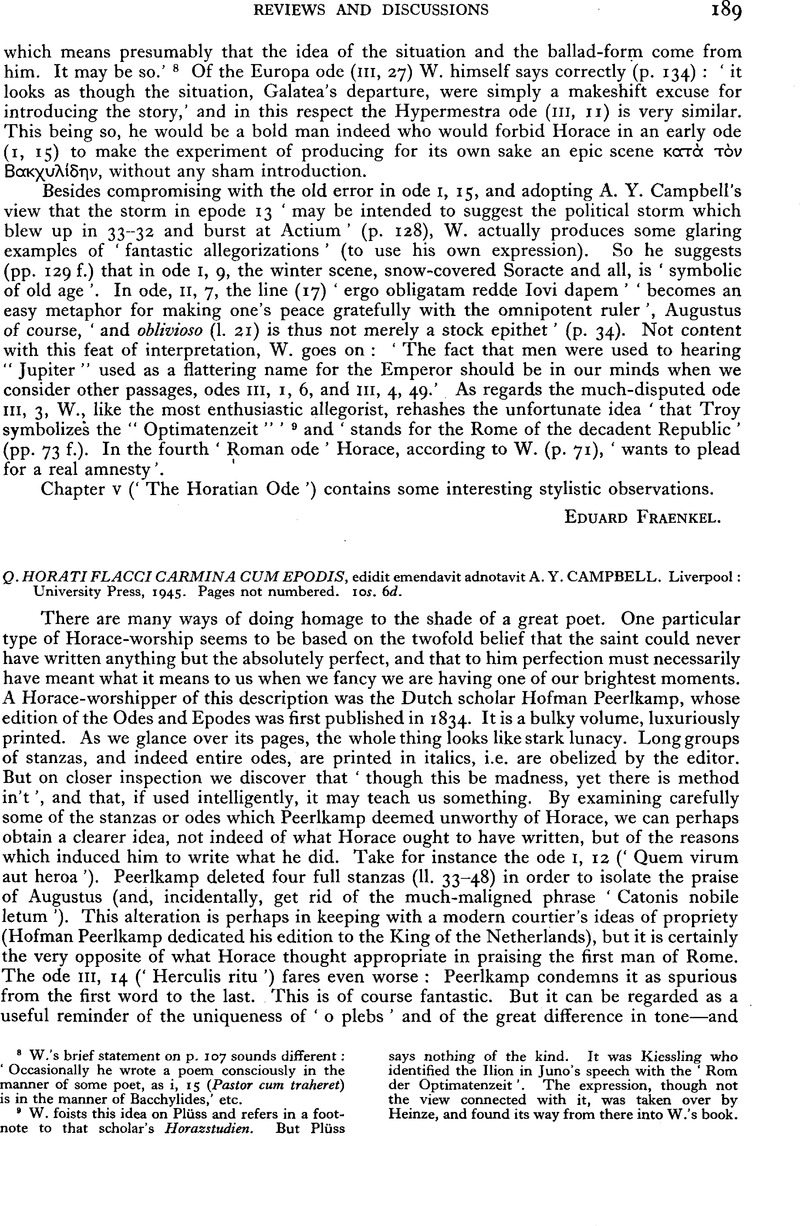No CrossRef data available.
Published online by Cambridge University Press: 24 September 2012

1 Q. Horatius Flaccus. Mit vorzugsweiser Rücksicht auf die unechten Stellen und Gedichte, herausgegeben von K. Lehrs (Leipzig, 1869)Google Scholar.
2 Textkritik (in Gercke, and Norden's, Einleitung in die Altertumswissenschaft, Band 1, Heft 2, Leipzig and Berlin, 1927), p. 6Google Scholar.
3 The errors of the metricians should not be quoted as evidence.
4 The reader should also be careful not to miss 11, 13, which in C.'s edition begins with ‘Ilex, nefasto’.
5 Cf. e.g. Sjögren, H., Zum Gebrauch des Futurums im Altlateinischen (Uppsala, 1906) 120 f.Google Scholar; Kühner-Stegmann, , Ausführl. Grammatik der Latein. Sprache II, 1, p. 144Google Scholar; Schmalz-Hofmann, Latein. Grammatik 5 556 (top of the page). I have not seen the article by Flinck quoted by Klingner on Horace, Odes I, 20, 10.
6 In 1924 Professor Campbell (Horace p. 212) made a few pertinent remarks on the ‘Messalla ode’ (III, 21), apparently without knowing that Norden l.c. had given a thorough analysis of this poem on similar lines. In regard to l. 5 ‘quocumque … nomine’ C. wrote at that time: ‘I am sure Horace chose the word because he was thinking of the various names of deities, and of such formulae as that of Catullus XXIV, 21, sis quocumque placet tibi sancta nomine.’ Now, in 1945, he expects us to swallow ‘quocumque fetum momine’. Quantum mutatus ab illo!
7 Bentley's note on ‘poscimus’, which he puts in the text, is excellent; perhaps he would have had less patience with ‘poscimur’ if he had seen that the whole ode is a prayer. For the beginning with a verb like ‘poscimus’, cf. e.g. Anacreon fr. 1 γουνοῦμαί σ᾿ ἐλαφηβόλε, Pind. P. 12, 1, αἰτέω σε φιλάγλαε C. reads ‘poscimur’, as does Klingner in the new Teubner edition. Büchner, Bursians Jahresb., Suppl. 267, 1939, 132, misses the decisive point.
8 C. says ‘post tecum fortius distinxi’. But the credit for this should go to Bentley's note.
9 Cf. my paper on ode iv, 2 (Sitzgsber. Heidelb. Akad., phil.-hist. Kl., 1932/3, 2. Abh.) p. 17.
10 Professor H. J. Rose, A Handbook of Latin Literature 268, n. 114, went out of his way to announce his consent.
11 Notice in this connection the fresh beginnings l. 13 ‘dicam’, 25 ‘dicam’, 39 ‘referam’.
12 This stanza, like many a hopeless forgery, is one of Dornseiff's pets: see Hermes 71, 1936, 464Google ScholarPubMed.